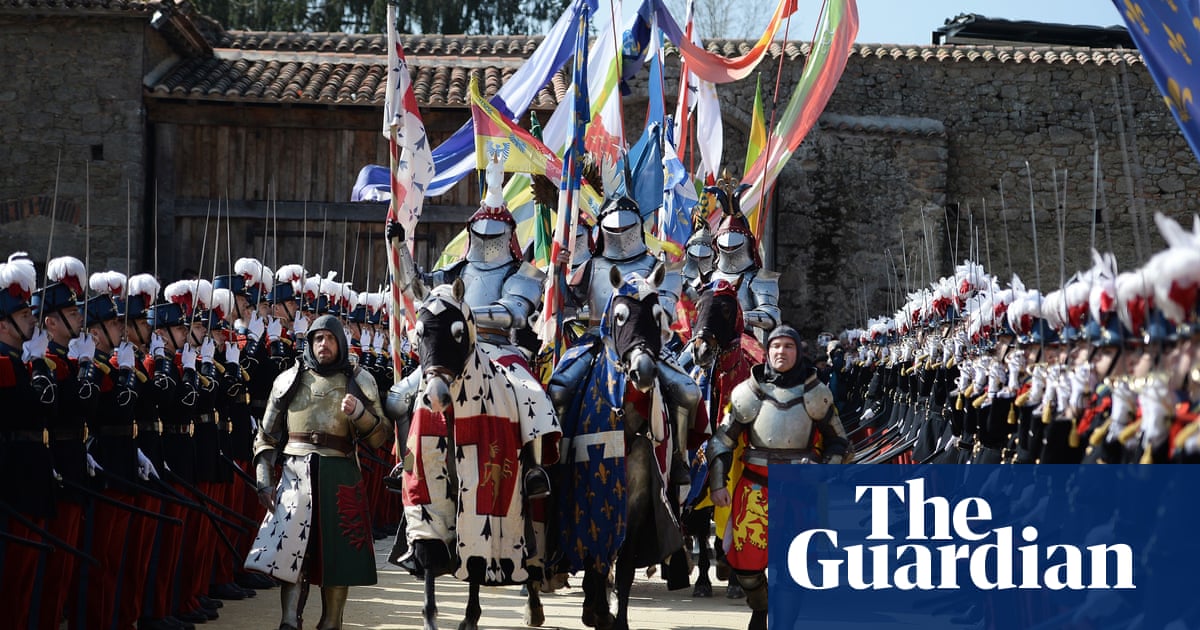With its spectacular shows featuring Viking longboats, Roman charioteers and sword-wielding knights who perform death-defying stunts, Puy du Fou in France is consistently ranked among the world’s best theme parks. Each performance of its centrepiece Cinéscénie show, which depicts 700 years of French history, features more than 1,000 actors, hundreds of horses and about 800 fireworks.
Now the company has set its sights on bringing its brand of immersive history to the UK via a £600m investment to build its mock medieval castles, hotels and restaurants on farmland just off the M40 in Oxfordshire. It has asked the upmarket property firm Savills to help with its planning applications and is expected to look for British co-investors for a project that it says will create thousands of jobs.
Some who live near the site, however, are dismayed at the lack of attention given to what they see as the French company’s dark underbelly, including ties to the far right and a past flirtation with Vladimir Putin. They question who their prospective new neighbours really are and what version of British history they plan to tell.
The founder and patriarch of Puy du Fou is Philippe de Villiers, the scion of an aristocratic family who conceived the project in the 1970s after discovering a ruined and nettle-covered Renaissance castle in the Vendée region of western France. The park quickly flourished and now welcomes more than 2.8 million visitors a year, making it the second most popular theme park in France, after Disneyland Paris.
De Villiers has devoted his remaining time to politics and he founded his own party, Mouvement pour la France, in 1994. MPF’s manifesto included a ban on the construction of new mosques and a prohibition on gay marriage and same-sex adoption. De Villiers still has a weekly political television show, on which he regularly rails against immigration and Islam.
At the funeral last month of Jean-Marie Le Pen, the founder of France’s National Front party, De Villiers sat among the most prominent guests, who also included his longtime associate and friend, the far-right presidential candidate Éric Zemmour.
A Paris court found Zemmour guilty of hate speech in 2022, his third such conviction, after a tirade against unaccompanied migrant children whom he described as thieves, rapists and murderers.
“What he defends is what I live for,” De Villiers said shortly after Zemmour made the remarks. “It’s what I suffer for, the defence of civilisation.”
Defending civilisation appears to have left De Villiers less time for Puy du Fou. These days it is his second son, Nicolas, who runs the park.
The younger De Villiers has focused on business rather than politics, but he did play a part in one of the more controversial episodes in Puy du Fou’s history. Father and son travelled to Moscow in 2014 where they met Putin in the Kremlin to discuss building two theme parks in Russia under the brand Tsargrad.
Putin’s tanks had rolled into Crimea earlier that year, annexing the territory in an act widely condemned by the international community. De Villiers Sr, however, declared himself a huge fan of his host and promised to help “promote the history of Crimea as a part of the long history of Russia” by building one of the two proposed parks in the region.
Puy du Fou’s local investment partner would have been Konstantin Malofeyev, a billionaire oligarch who had already been put under sanctions in the US, UK and EU over his financing of Russia-friendly separatists in Ukraine.
Nicolas de Villiers may have sidestepped his father’s far-right views, but they stood shoulder to shoulder when it came to relations with Putin and Malofeyev. In an interview in the trade publication Attractions Management in 2015, De Villiers Jr described Putin as having “sweet eyes and sweet words”, and insisted the international community had misunderstood him.
He said sanctions would not affect plans to build a Crimean park, and Malofeyev was a man of “great moral power”.
In the end, the two parks never materialised, but Philippe de Villiers’ politics and the family’s open flirtation with Putin have not gone down well in Oxfordshire.
A Puy du Fou spokesperson said the company was not alone in having explored investment in Russia at the time, but had been “caught off guard by the rapid deterioration of the geopolitical situation in Russia and Crimea”.
“Quite properly we cancelled this initiative once the international sanctions regime was established,” they said. “Our Russia initiative never went beyond an outline concept. Once we had made the decision to withdraw from the project, we have had zero involvement in Russia since then.”
Charles Harman, a former banker who has set up two charities dedicated to helping Ukrainians and lives next to the site of the proposed Oxfordshire park, thinks the damage had already been done by that point.
“They were playing right into Putin’s hands, providing a propaganda coup for him,” he said. “The idea that they could be welcomed here with open arms, I find deeply offensive.”
Natalia, a Ukrainian refugee who has lived in Oxford since fleeing Kyiv in 2022, declined to give her surname for fear of reprisals. She said: “I do not support anyone who supports Russian invasions anywhere, not only Ukraine but Georgia and other countries. For me, it’s really hurtful if the park is allowed because it will show the weakness of Europe.”
Natalia said the greater danger might be more subtle – that the De Villiers family’s political beliefs and connections could filter through into the park’s output. “People’s beliefs are a very powerful thing. Once they believe something, it’s hard to show them they were wrong.”
French politicians and historians, particularly on the left, have raised similar concerns. Sceptics include a group of academics who published Le Puy du Faux, or The Peak of Falsehoods, a book documenting what they saw as the park’s Catholic traditionalist, and potentially misleading, slant on history.
One of the authors, Guillaume Lancereau, described the park as offering a “nationalistic, religious and conservative political agenda”.
after newsletter promotion
Flo van Diemen van Thor, who lives in Bucknell, population 200, beside the proposed park, is unsure about what history Puy du Fou can offer to an area that already boasts a church with sections dated to 1074. The Trigger Pond, the local pub where she shared her concerns, has been serving thirsty locals since 1637.
Van Thor, a co-founder of the North Oxfordshire Residents’ Action group, set up to monitor local developments, fears the De Villiers’ political affiliations cannot be divorced from their attitude to history.
“This is going to be part of popular culture and there are a lot of people who find it hard to distinguish between fact and fiction. You need to be careful with that,” she said. “Who gets to choose the history that’s getting told?”
The answer, in the past at least, has been Philippe de Villiers, who wrote the original scripts for Puy du Fou’s centrepiece show.
The company did not address the Guardian’s questions about De Villiers’ political beliefs but has previously told French outlets that he is not in charge of day-do-day operations.
French corporate documents seen by the Guardian suggest he retains a significant role within the group. They suggest he is still a director of Puy du Fou France, the company that operates the park. He is also a director of Puy du Fou Stratégie, which operates on a not-for-profit basis and acts as a holding company.
This entity owns 47.2% of Puy du Fou France, according to an investigation by the French media outlet Mediacités published in September 2023.
It increased its stake to this level by selling the rights to use De Villiers’ scripts to Puy du Fou France, apparently in exchange for shares, the investigation found. The company did not answer questions about whether this stake had since increased.
Even if De Villiers no longer controls the park’s operations, he certainly appears to have wielded his political clout to its advantage. Puy du Fou was one of the first attractions to open its doors when France’s Covid-19 restrictions were lifted, welcoming visitors before even Disneyland Paris. According to reports in France, De Villiers had lobbied Emmanuel Macron, with whom he enjoys a cordial relationship.
Puy du Fou was excluded earlier this year from the Culture Pass, a government-subsidised scheme providing young people with access to cultural experiences. De Villiers denounced the omission as a “scandal” and Puy du Fou was duly included within a matter of days.
Lacking the same political heft in the UK, the company has begun wooing local people. Executives from Puy du Fou have been in Oxfordshire, giving presentations to their prospective neighbours and attempting to allay concerns.
Some in the community say the company has invited local politicians to France to showcase what Puy du Fou has to offer as part of its charm offensive.
Puy du Fou did not directly address Philippe de Villiers’ political affiliations in response to questions from the Guardian. Instead, it criticised certain “nimby” residents who “clearly believe the way to defeat our project is to attack Puy du Fou by bringing up matters entirely peripheral to the relevant town planning issues”.
It said some of the local criticism was “simply untrue and some is gross distortion, trying to create a conspiracy where none exists to gain media attention for their campaign”.
The company said its investors, as well as local and regional governments in France and Spain, where it also has a park, had carried out due diligence on the company and did not have any concerns.
It said it would not “engage in an endless Q&A about spurious matters dreamt up by people who only wish to block this substantial investment which will create an outstanding cultural project celebrating British history”.
The company said it had an excellent track record of working positively with government and civil society groups “from left to right”.
Article by:Source: Rob Davies















